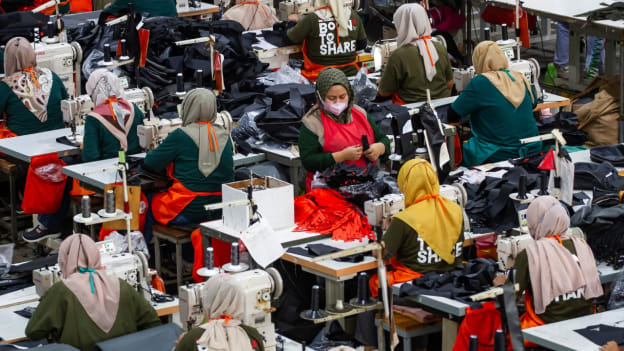Indonesian textile giant Sritex fights back against bankruptcy, vows to protect 50,000 jobs

Indonesian textile giant Sri Rejeki Isman, commonly known as Sritex, is contesting a recent court ruling that declared the company bankrupt. This legal battle comes at a critical time, as the firm’s owner is determined to keep the factory operational and is committed to reviving the business amid significant financial distress.
On October 25, Sritex filed an appeal against the local court’s bankruptcy ruling, which had been issued after the company failed to meet payment obligations outlined in a debt restructuring agreement from 2022. The court, located on Java island—where Sritex is headquartered—granted the plaintiff’s request to declare Sritex and its subsidiaries bankrupt, a decision that has significant implications for the company and its workforce.
In the wake of the bankruptcy ruling, Indonesia's new President Prabowo Subianto convened a meeting on October 29 to discuss potential rescue options for Sritex. Coordinating Minister for Economic Affairs, Airlangga Hartarto, revealed that the Customs and Excise Office has allowed Sritex to resume its import and export operations despite the bankruptcy decision. This development is seen as a crucial step in supporting the company’s ongoing operations and preserving jobs.
Sritex is one of Indonesia's largest apparel manufacturers, producing garments for international brands such as H&M, Uniqlo, and Zara. The company employs approximately 50,000 workers, making it a vital player in the Indonesian textile sector. However, the pandemic severely impacted its operations, leading to significant financial difficulties. As of June 2023, Sritex reported total liabilities of approximately $1.6 billion (SGD 2.1 billion), highlighting the scale of its challenges.
Deputy Minister of Manpower, Immanuel Ebenezer Gerungan, assured the public during his visit to Sritex’s factory on October 28 that there would be no layoffs among the company's employees. This commitment was confirmed by Sritex owner Iwan Setiawan Lukminto, who expressed determination to keep the factory running. He stated, “We have no intention of closing our factory and are focused on continuing operations. Our business and financial conditions have shown signs of recovery over the past few years.”
However, the struggles facing Sritex are not isolated. The wider Indonesian textile industry is also grappling with challenges. Rival firm Pan Brothers is seeking to restructure its debt, which stands at $325 million. This situation is concerning for the Indonesian government, particularly as it seeks to bolster economic growth from its current pace of 5% to 8%. The textile industry plays a crucial role in employment, and any significant job losses would pose a considerable setback for President Prabowo’s administration.
The Indonesian textile sector is known for its high proportion of female labor participation and unskilled workers, making it politically sensitive. Dr. Kiki Verico, an economist at the University of Indonesia, emphasized the importance of protecting these jobs, stating, “The clothing industry has the highest proportion of women labor participation and unskilled workers. These two groups are very politically sensitive.”
In response to the ongoing crisis, domestic garment associations have called for increased government support to revitalize the sector. The industry has been struggling to recover from the pandemic and is facing stiff competition from cheap imports, particularly from China. Despite the introduction of some protective measures, including anti-dumping duties, industry stakeholders are urging the government to tighten recently revised import regulations to manage the influx of foreign products.
The impact of the textile industry's struggles is already being felt. According to the National Federation of Trade Unions, nearly 15,500 workers in the textile sector have been laid off in Indonesia in 2024 alone. This statistic highlights the urgency of the situation and the need for effective intervention to preserve jobs and stabilize the industry.
As Sritex moves forward with its appeal against the bankruptcy ruling, the outcome will not only determine the fate of the company but will also have broader implications for the Indonesian textile industry and the workers it employs. The government’s commitment to saving jobs will be crucial in the coming weeks as stakeholders seek to navigate the challenges ahead.
In summary, the battle against bankruptcy for Sritex underscores the significant pressures faced by the Indonesian textile industry, a sector that plays a pivotal role in the country's economy. With the government actively seeking solutions and the company committed to its workforce, the next steps will be critical in shaping the future of Sritex and its employees.
















